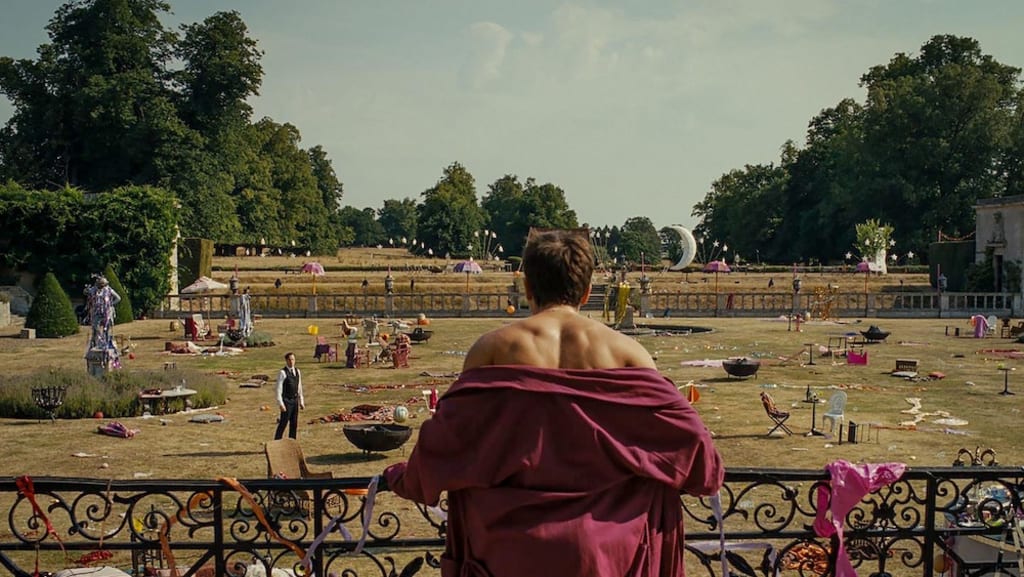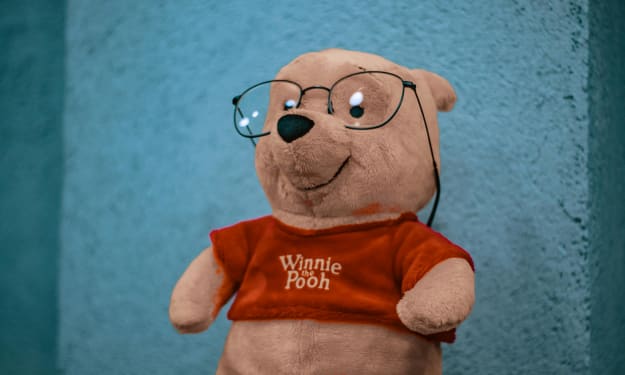2006 to 2024: Why Saltburn Shows Nothing Has Changed
A mirror of cultural stagnation

Saltburn. I’m sure you’ve seen it. If not, this fictional film is about an unpopular, isolated 20-year-old (or thereabouts) university student who unexpectedly falls in with a popular crowd and is invited to a sprawling country estate called ‘Saltburn’ to spend his summer.
Chaos ensues.
It’s set in 2006 – 18 years ago. There are only two ways you can tell, the first is a sign saying “Welcome class of 2006” at the start of the film, and the second is the mobile phones the various characters use. That’s it.
Everything else is the same as today. Everything; the clothes, the music, the decor, the speech, the haircuts.
If this film came out twenty years earlier, in 1994, and it was set in 1976, it would look and feel remarkably different from its release date.
This has me convinced we have hit a cultural cul de sac. Nothing is changing anymore.
I have teenage kids. They dress like I dressed in the 90s. Baggy clothes have come back around. They listen to old music they’ve picked up from TikTok or Netflix shows. A recent example of this is Running Up That Hill (A Deal with God) by Kate Bush, which featured in Stranger Things and rocketed it back to number one in the charts for the first time since 1985. Saltburn itself had this effect with Murder on the Dancefloor by Sophie Ellis-Bexter which saw the mid-40s pop star back on prime time television (if anyone watches that anymore) after her song featured prominently in the film.
Saltburn brought to my attention the feeling I’ve had for a long time, the feeling that the so-called “end of history” – marked by the victory of Western liberalism and the collapse of Soviet Russia – wasn’t actually the end of politics but, in fact, the end of artistic creativity.
The “end of history” was exactly around the time Nirvana’s Nevermind was released in September 1991. It was the same time grunge exploded into the mainstream along with house music, drum and bass, and the rave scene. It was still a time when new music “scenes” were a thing. Brit-pop was another to follow. The mid to late 90s even pushed out some groundbreaking cinema – The Matrix, Fight Club, Pulp Fiction… and on it went.
Then came the noughties (2000–2009) which brought us… nothing.
Music was tepid and branded “landfill indie” as guitar bands died a slow decade-long death. Cinema became more risk-averse as DVDs disappeared, making cult classics financially unstable gambles. Fashion was appalling; bootcut jeans and slip-on shoes with suit jackets. Millennial messy jagged haircuts. Dark shiny shirts with suits. Everyone looked like shit (female fashion was equally as dire, joined in a Venn diagram of bad taste, or perhaps just a complete lack of direction).
It was a cultural low point.
No one knew how to handle the new millennium. Terrorism took on new power and meaning as 9/11 marked this new beginning. Technology was exploding, but in fragmented directions, not understanding its purpose or destiny. There was no social media, but kids were still online, in text-based chat rooms and running geocities websites with flashing gifs and visitor counters. People owned Kindles but still bought books and read newspapers on the train home. We had iPods and flip phones, minidisc players, desktop computers and laptops all at once, as technology straddled the chasm between the old analogue world and the digital frontier, nothing consolidated, nothing with a wider vision.
Everyone waited for the next big cultural movement amid the identity crisis of music and tech. It didn’t come.
And perhaps this is why things sort of treaded-water. And they have stagnated ever since.
Social media and smartphones arrived and merely amplified nostalgia (see TikTok music above).
Huge music artists such as Taylor Swift and Ed Sheeran who emerged from the ashes of the noughties came with a yesteryear feel – country, folk, singer/songwriter. Heavy guitar music was dead, nu-metal saw to that. Hip-hop also did nothing new. New artists like Drake were toning it down, not pushing boundaries. EDM was EDMuch-the-same-as-before, but even more commercialised and slick, found in mainstream festivals, not dirty basements anymore. For the first time since Elvis, a new scene or genre failed to emerge.
Traditional and characterful party destinations such as Ibiza and Malaga were slowly usurped by the all-encompassing Dubai, a cultural black hole with no identity of its own, other than it is shiny and new, where giant skyscrapers stand with swimming pools on their roofs and porcelain veneers in the mouths of their guests. A perfect characterless metaphor for the times. Dubai is the geocities of, well, cities.
Admittedly, television triumphed more in this time than anything else (though I’d argue it was still stagnant in the noughties).
Streaming services were turned on (BBC iPlayer started in 2007 and Netflix reached British shores in 2012) and binging on series became a thing – or “seasons” as they’re now called thanks to the transatlantic amalgamation of culture – and shows like The Office exploded across Britain and America.
But even they were rehashes of sitcoms of old. If we look back to Stranger Things once more, it is a superstar performer for TV, but set in the 1980s. Peaky Blinders is set in 1919. Ghostbusters is back. But once again, hankering for nostalgic magic.
Sure, it’s easy to cherry-pick these shows amongst a plethora of modern-day releases (Breaking Bad, The Wire), but Beyoncé has just realised a fucking country song. If that doesn’t highlight the fact we’re looking back, not forward, I don’t know what does.
Saltburn shows that 18 years ago is essentially the same as now. If pop culture is moving it’s gone from a spirit to a crawl.
The only cultural shift I can detect is the political polarisation that has been bubbling since the World Wide Web began, and especially since the birth of social media. This culture war isn’t about creative culture however, it is about social opinion and values. It is “woke” versus “trad”, it is about blue versus red, it is about young versus old.
Boomers who never lived with technology struggle to comprehend the impact of social media. Half the world is living online and they are still watching the news and buying The Daily Mail.
Similarly, the young cannot fathom a world that was disconnected, where waiting for anything was ever a thing, where people could go weeks, or even months without looking at a screen of any kind.
The division is real.
All we have developed since the “end of history” in the early 90s is a technological dystopia.
Now the 2020s are here, and they have so far been consumed with AI and large language models, of Apple Vision headsets, and Alexas and Ring doorbells in every home. The genie is out of the bottle. Convenience is king, but as technology grows exponentially, art knows nothing but how to eat itself. Everything is post-modern. Everything is self-referential. Everything is a sample, a remake, a circular reference.
Microsoft Excel won’t allow a circular reference, but culture will. Memes are nothing but circular references. Memes of memes of memes dominate timelines. TikTok is a platform that actively encourages trends, repeated jokes, and reused sounds. It has 1.2 billion users and counting.
The end of history has become the end of culture. People enthusiastically share AI art created by machines, they push videos made by text prompts. Creativity, if anything, is being sucked further back as these AI engines look to a collective past to create anew. “Give me a man and woman walking through a park in the style of Van Gogh” and an AI entity will pump out something cobbled together from a million reference points on the internet.
Someone once said creativity is the cut-copy errors of the human mind. Some of the great songs, films, and paintings have been made through the inspiration of others, imitation pushed through the infinitely complex filter of the human soul.
AI doesn’t have a soul. And this is what civilization has been moving towards. Perhaps modern culture has become so innocuous and passive that we welcome our new technological overlords with open arms. Maybe we were subconsciously preparing all along. We all knew technology was going somewhere and it seemed like no one wanted to move until it declared a battle plan.
AI is a lot of things, but it isn’t human. It isn’t us. It isn’t culture. It will be able to replicate and replicate some more, but it can never look forward, at least not in an artistic way.
2006 and 2024 are the same. Saltburn showed us that. I suspect 2024 and 2042 will be the same, expect more fucking technology. More AI. More convenience by machine. More nothingness.
Perhaps the 90s was the end of history. Just not in the way we first thought.
About the Creator
Jamie Jackson
Between two skies and towards the night.






Comments (2)
We've just included this in a Vocal Social Society feature. Would love to see you there . https://www.facebook.com/groups/376191867241324/permalink/988138506046654
A lot of excellent points, I thought Saltburn was excellent, but only when it finished. All the way through I didn't like what was happening but I'm glad I stuck it out. Excellent article